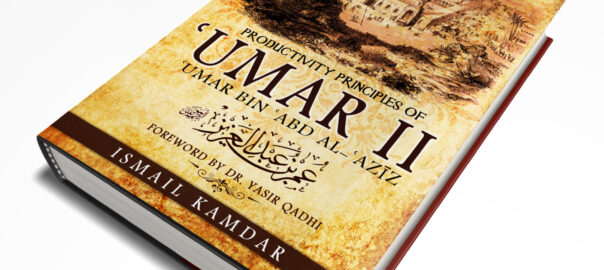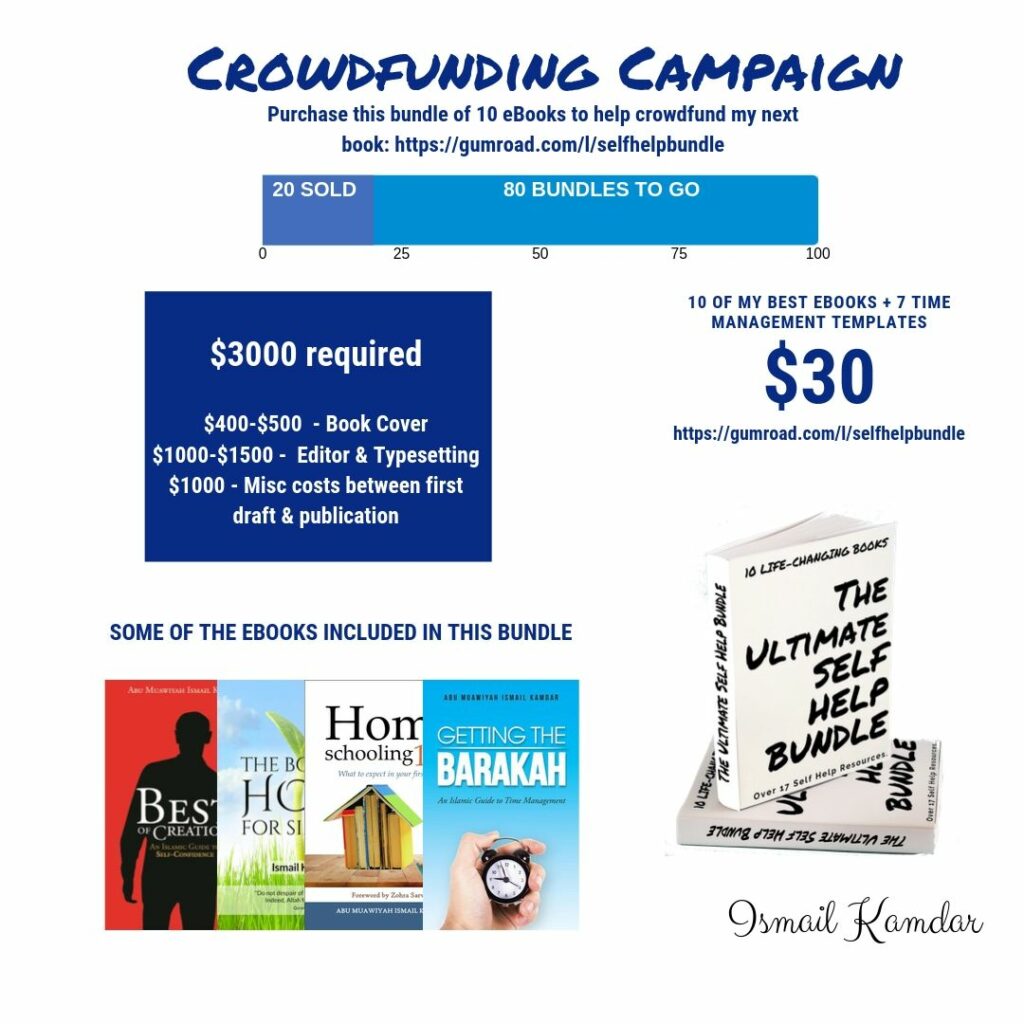Productivity Principles Of ʿUmar II is a powerful book for serious individuals who want to Show Up, Take Responsibility for their lives and Take Action in attaining the Best and most Productive version of their true selves.
‘Time is money’, as the saying goes. With limited time on this planet, ‘how’ we use this most valuable currency of time is what truly differentiates success from failure – regardless of what we do.
This book unveils 15 powerful Productivity principles and lessons derived from the life of ʿUmar bin ʿAbd al-ʿAzīz (Arabic: عمر بن عبد العزيز) commonly known as ʿUmar II, the 8th Umayyad Caliph.
Who Was ʿUmar II?
Born in Medina in 682, he was the matrilineal great-grandson of Islam’s 2nd Caliph ʿUmar ibn Al-Khaṭṭāb (R.A). His immensely transformational rule as Caliph lasted from 717 until his death in 720.
Despite his short reign, ʿUmar II accomplished major milestones and brought about lasting change in the entire Muslim world through his robust manner of governance. He made solid reforms in provincial administration, military strategy, education, taxation, fair dispensation of Zakah, Islamic propagation and public works.
The book overviews a summarized history of the first century of Islam while presenting a detailed biography of ʿUmar II, as well as including two sections of discussions on some of the more difficult aspects of Islamic history such as military expansion and slavery.
Imagine Being Able To..
- Accomplish more by managing your Time, Attention and Energy
- Cement Self-Discipline; hacking your daily habits while building unshakable Self-Control
- Create and enhance laser sharp Focus
- Eliminate Procrastination and lack of Motivation
- Compound the effect of short-term tasks for long-term success
- Do more with less – and get better results
- Gain extreme and lasting Productivity
- Reignite the love and passion for Islamic History
….and more!
Dr. Yasir Qadhi – a globally renowned Islamic Scholar, TV personality and highly revered theologian, lecturer and educator on Islam, says this about the book:
“Through a deep analysis of ʿUmar life, the author Shaykh Ismail Kamdar brings to light various life-changing principles that ʿUmar implemented. ʿUmar II is an excellent role model for each of these principles, which Ismail has broken down and discussed in detail throughout the book.”
Discover exactly where to start, what to do, and how to follow up each action you take with life-altering productivity principles that bring in lasting results!
Reclaim the Keys to the Extraordinary
Productivity Principles Of ʿUmar II is intricately written to remove the negative flow of energy, emotional and mental blockades, procrastination habits and self-limiting beliefs that have you locked outside the doors of your fullest potential.
The outside space is not fertile ground for change. Being locked out of your mind is a quicksand that swallows you with each passing moment. Nothing can be done in the outside space.
The keys lay on the inside, and while you’re scared to step in, the Productivity Principles Of ʿUmar II empowers you to do so – successfully, tangibly and sustainably, while creating the most pristine level of whom you are and what you can be.
From historical, contemporary and Islamic standpoints, the book dissects the important facets of your life and surgically enables you to identify, analyze, work towards and strengthen areas that eventually lead you to the keys within.
The keys to the Extraordinary; a life based on only the most highest, polished, magnificently wondrous and productive version of yourself.
And you accomplish all of this – without feeling like a stranger or without experiencing anything foreign. Everything is naturally and carefully aligned to resonate with your integral values as an individual, as a human being, and most importantly as a Muslim.
Unravel the Productivity gems of ʿUmar II that lead him to govern the Islamic State with great ability and progress until his passing at the young age of just 37!
Through the rich repository of ʿUmar II’s life and legacy of successful governance as Caliph, this book will empower you to achieve the most optimal, efficient and productive version of You.
How?
The book accomplishes this by combining the magnificence of Islamic history with the practicality of modern day productivity techniques. Techniques and approaches you can begin applying in all the critical areas of your personal, professional, social and religious spheres of life – today!
What If You Could Conquer These Obstacles In Your Daily Life?
- Lack of self-confidence
- Inability to retain information
- Irregular consistency
- Getting started and maintaining progress
- Losing focus and not following through
- Lack of accountability and performance measurement
- No self-discipline
- Laziness and loss of motivation through routine tasks
- Feeling lost and discouraged
- Struggling with procrastination in everything you do
….and more?
And…
What If You Could REPLACE Those Obstacles With…
- Gain Immense Clarity
- Harness Your Unique Talents
- Create a Powerful Life Vision
- Actualize Your Full Potential
- Increase Self-Care and Fun
- Attain freedom to Live Life on Your Terms
- Develop Constructive Mind Shifts
- Produce Positive Flow of Energies
- Become the Gatekeeper of Your Domain
- Counter Stress and Hardships
- Re-Engage Your Inner Connectivity
- Ignite Your Passion
….and more?
Discover how you can ELIMINATE barriers keeping you from a productive, wholesome and more successful life. Barriers can only be broken when the actual problems and existing struggles are identified, promptly fixed and successfully built upon.
This comes through the right approach, knowledge and direction.
Productivity Principles Of ʿUmar II accomplishes this by laying a solid framework for building a strong, uninterrupted and action-oriented approach to productivity with key principles such as:
- Delegation (The power of doing ‘more’ with less)
- Prioritization (Why our stop-doing lists need to be bigger than our to-do lists)
- Benefiting Society (Living life as a productive & responsible member of society and benefiting everyone in it)
- Shura (Consultation) with experts (The value of collective consultation within the light of Islam)
- Mentors and Role Models (The importance of selecting the right mentors and emulating legitimate role models)
- Abundance Mindset (Focusing on the limitless possibilities that exist in life. Choosing to think in positive terms about everything that happens in life, good or bad)
…..and more!
Productivity Principles Of ʿUmar II is your beginning to a journey enriched with clear, effective and results-oriented steps to leading a better and lasting productive life.
The book emphatically guides you with awe-inspiring lessons from Islamic history, while focusing on 15 Key Productivity Principles from the life of Umar II.
GET Your Copy Today!
This is your chance to live the highest most in-tune version of yourself – while you still have the valuable ‘currency’ of time left on this planet.
All you need is a beating heart, breathing lungs and the willingness to invest in yourself by taking charge.
Day One or One Day?
You decide, before one-day turns to many days, and many days become many years, and many years result in a life wasted.
Make your today, your day one.
About the Author
Shaykh Ismail Kamdar is a widely renowned and internationally respected author of several best-selling publications that focus on areas such as self-help, self-development, mindset, time management, productivity, organization etc. under the light of Islamic jurisprudence; the Quran and Hadith.
Considered by many in the Muslim space as a ‘go-to authority’ for what he does, his works include: Having Fun the Halal Way: Entertainment in Islam, Getting The Barakah: An Islamic Guide to Time Management, Best Of Creation: An Islamic Guide to Self-Confidence, and Homeschooling 101, among other popular titles.
Starting his study of Islam at the tender age of thirteen, Shaykh Ismail Kamdar has been actively involved in Islamic work since the age of sixteen.
Noticing a severe lack of Islamic literature dedicated to the field of Personal Development & Self-Help, he founded Islamic Self-help in April 2015. It was established as a platform to help Muslims gain knowledge that can assist them in personal development through Self-Help articles, books, and courses.
He completed a seven-year Alim course in 2007 and a BA in Islamic Studies from Islamic Online University in 2014. He is currently a senior lecturer, as well as the Faculty Manager of the Islamic Online University, and is involved in multiple Dawah projects around the world.
Purchase Links:
PDF Edition: https://gumroad.com/l/umar2 (53% DISCOUNT FOR LIMITED TIME ONLY!) alternative link – https://payhip.com/b/O573
Kindle Edition: https://www.amazon.com/Productivity-Principles
Paperback Edition Links:
USA: https://www.amazon.com/Productivity-Principles-%CA%BFUmar-II-al-%CA%BFAz%C4%ABz/dp/1703555384/
UK: https://www.amazon.com/Productivity-Principles-%CA%BFUmar-II-al-%CA%BFAz%C4%ABz/dp/1703555384/
Canada: https://www.amazon.ca/Productivity-Principles-%CA%BFUmar-II-al-%CA%BFAz%C4%ABz/dp/1703555384/
South Africa: https://hikmah.co.za/product/productivity-principles-of-umar-ii-by-ismail-kamdar-foreward-by-dr-yasir-qadhi/
Australia: https://dhikr.com.au/shop/productivity-principles-of-umar-ii-umar-bin-abd-al-aziz/








